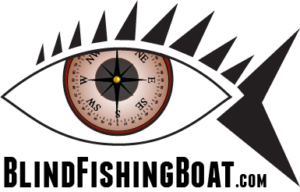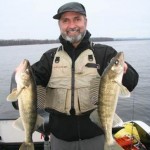Question about Sailing Blind
Hello Lawrence,
I have read with interest of your adventures on the Blind Fishing Boat for several years. I’ve always been fascinated with what you are doing, as I live full-time in North Vancouver aboard my 31-foot sailboat. So far, my friend and I have always sailed together, but we are planning to do offshore voyaging within the next year or two.
My friend is sighted, but I am totally blind. Before I continue making inquiries into which GPS/chart plotter systems might be the most accessible (for me to use during my watches), I thought I’d check with you to find out what equipment you’re already employing to successfully and safely navigate lakes while fishing.
Is the navigation system you use proprietary or off-the-shelf? If you’ve developed it, is it available for purchase?
Does the system you use incorporate a GPS and digital compass, so as to be able to provide quicker feedback for course corrections?
I have taken numerous boating and cruising courses from the U.S. Power Squadron, and do hold my Washington State Boater Education Card. My friend and I have performed the majority of a substantial refit of my Golden Hind 31 sailboat over the past four years, and have sailed almost five hundred miles from Seattle, WA to Nanaimo, BC and dozens of ports in between. My exact boat was sailed from England, across the Atlantic Ocean, through the Panama Canal, and two Hawaii and back at least twice, all by the previous owners.
If you’d ever have time to share thoughts on my questions, I’d sure be grateful. Email works well, or you could tell me the best time to phone you. Or, my number is…. (I am nearly finished my time at the Louisiana Center for the Blind here in Ruston, LA, and then I’ll be heading home to Vancouver again.)
Take care, and thank you again
Hi,
You’re truly living the dream aboard a boat off Canada’s west coast. I’m sure most everyone this side of the Rockies has seriously considered chucking everything to do as you.
Seriously though, a true marine-quality GPS / cardinal compass navigation system for the blind has yet to be mass produced, or even developed for beta testing. Just not a lot of demand for this level of independent navigation.
Lots of folks have experimented with audio technology and digital compasses, and at one point the MaxPAC audio digital compass was being developed for use by blind sailors, but more for racing than long-distance travel. I have both earlier and latest versions, the most recent having features for course alterations and role compensation. I believe the MaxPAC is still under development. The person you want to email about this in the U.K. is now Bob Godzicz bob.godzicz@btinternet.com.
A few years back a blind sailor attempted a solo crossing of the Atlantic out of Boston, but the trip was called off 2-days out due to storms and heavy seas. He had his entire boat equipped with audible navigation equipment that was developed specifically for his voyage. I don’t believe the venture was ever attempted again.
Another low vision couple attempted a round-the-world trip aboard a sailboat out of California. They changed boats in Hawaii, but after they arrived in Australia, the voyage came to an end. You would need to contact either of the two sailors to learn more about that trip, but what I learned from their blog, there was nothing special about what they used other than off-the-shelf blind technology.
Miles Hilton Barber piloted a micro plane half way around the world using an audible compass system developed for him in the U.K. but it was a one-off device which I believe Miles still has.
I’m always interested in discovering a mobile phone application that would serve, but almost every system I’ve found on the App Store is map-based and not helpful for those who want to navigate “as the crow flies”. Sendero Group in the U.S. was working on a GPS navigation system that was to include features of interest to blind sailors, but the entire set of technology needed to use the product cost well over $2k. Not sure if they continued with this direction as my searches on line always seem to come up blank. specific
Trekker from HumanWare is still the best bet in this regard, and it’s somewhat ruggedized. You can use GPS to navigate as the crow flies, but you need a destination way point to target. I believe they have something new out now, but I’ve yet to give it a try.
The compass that comes with the iPhone is pretty accessible and functional. It gives a cardinal heading that speaks every time there’s a change or you touch the screen. Very handy and fairly accurate to a couple degrees, which as you know, can make a big difference on the ocean.
Recently, Microsoft came out with SoundScape, a three dimensional audio system that allows you to create and save waypoints, and then navigate back to each through a series of sounds that shift from left to right ear when using stereo headphones. It also responds to the direction you are pointing the phone itself. Not yet available in Canada, it truly is a ground breaker.
You can go crazy buying and trying tech that wasn’t made exactly for what you want to do, which is crossing the ocean. Personally, I try not to become dependent on technology, but to use it only to enhance my skills as a navigator. It’s how I was able to become the only Canadian to ever have won an international blind sailing regatta.
Over time I’ve learned to navigate by the feel of the wind and waves and sun. Smell and sound also come into play. It’s how people navigated boats for century’s right up to quite recently. With the fog off Canada’s east coast, being a fisher meant getting home with the catch under any condition. Nothing like death to sharpen ones senses.
I know it represents an investment, but I’d get a good autopilot device and radar with an audible collision alert feature, and let the technology do the work. The advancements made in marine navigation are simply amazing – the industry developed self-piloted ship technology years ago.
Good luck with your future voyages, and keep us posted on how things turn out.
Best, Lawrence

